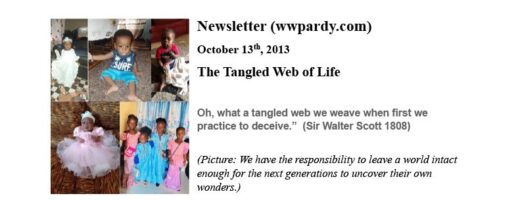I have been to places where time has stood still, to others which time has passed by and now I live in a place where time has little meaning.
There has been much written about living in the “now”. If you Google this topic you will see references for almost 1.5 billion pieces of information. This idea has been promoted by self help gurus and counselors of all sorts as the way to happiness. This would suggest that happiness can be constant and time will stand still.
But in countries such as those in Africa the rationale for giving time little meaning emanates from a different place, rather than a trendy fad from the west; it relates to their past. Giving time little thought is perhaps a means to masquerade the cultural hurt, even harm that has been inflicted on generations of people over centuries.
It is also a means to deflect the realities of a future that is impossible to imagine, much less create.
The future has its own form of expression. It usually appears when we least expect it, despite all of the modern intellectual and planning processes to create and manage it. The near collapse of the banking system happened unbeknownst to its architects, the executives, regulators and politicians alike. It has shaken the very core of the economy and the society it is meant to serve. The aftershocks are still causing palpations across the whole world.
Living in the “now” might make trendy theory, but ultimately does little for human consciousness or physically well being over time.
Einstein suggested that the past, present and future co-exists simultaneously and in the same moment; beyond which was timelessness.
So living in the “now” doesn’t negate the past nor preempt the future. It just means that they need to be dealt with at the same time. It is why the past has such significance, not only to the now, but as a means to help shape the future.
If we let others, rather than ourselves, interpret our past and decide our future then it is possible happiness might not appear at all. This is and has been a fundamental flaw in most recent approaches to development; and is why much of the world is so poor.
Development in most of the world, whether social or economic, has been not only conceptualized by others; it has been imposed by them as well. And for the past several decades the imposing has been done by many development institutions designed for a different era.
What is missing in the development equation, other than respect for the past, is the knowledge that a future cannot be imposed; it has to be created. Creation takes imagination and the involvement of many.
Most of all it takes time; not artificially fixed deadlines and schedules, as is the norm in most development processes.
In most cases people haven’t been engaged or involved in their own development. Neither have they been brought along to the point where they can imagine their future. They have been told what it will be. Genuine development should be based on peoples’ attributes and realities, not on needs or wishes as perceived by others.
In our world of “now” the future looks bleak, but if a moment was given to reflect upon history, it would be evident that this moment has appeared on many previous occasions. As a result, people had to recreate their present to establish a future. Holding on to our “now”, which is flawed, won’t create a future.
Imaging the world differently, one that is more balanced and that benefits all of humanity is not a new concept. But, as in the past, the concept has been dismissed in favour of the status quo by those who wish to protect their wealth and status.
It is an undeniable truth that life, the ecosystem and the universe are all about balance. Why then is there such resistance to bring balance to the way the assets, benefits and wealth of our world are shared.
Imagining a world where every person matters, where a healthy environment is essential and where benefits are shared equitably is not such a stretch and certainly not a new concept. The idea has been around for millennia, perhaps since the beginning of human existence. It is a timeless concept and not a utopian dream nor an impossibility.
We do know how little it requires for people to exist in this world; it is evident in the poorest places on earth. We know how little it would require to make their lives more livable. We also know what tremendous resources still exist within our own planet and we have some knowledge of the potential of the universe.
What we apparently don’t know or refuse to explore is how to share it more equitably. But, if we would imagine, just for a moment, the benefits that would accrue to all by more equitable sharing, maybe we would realize our true wealth as people, as society and as humans living in a world that continually rebalances itself.
Perhaps, one generation might arrest the suffering of the many, resulting in the few having just a little less. Then, perhaps for once, in a human context, the past would have intersected with the present laying the foundations for a better future for all.
Timelessness, as envisioned by Einstein, may then have new meaning.
Written by Bill Pardy
November 26th, 2011


